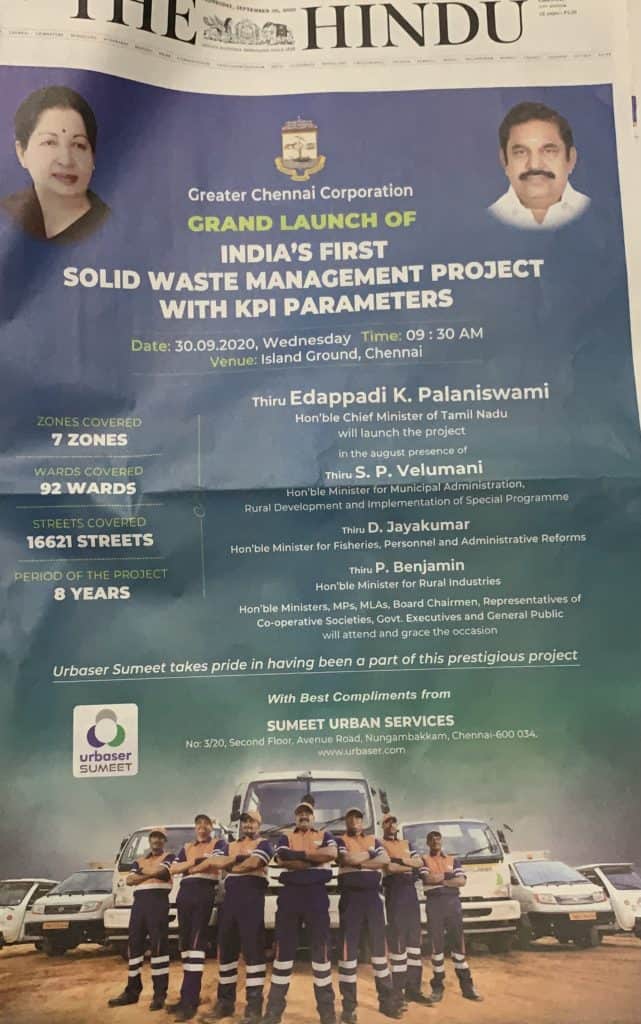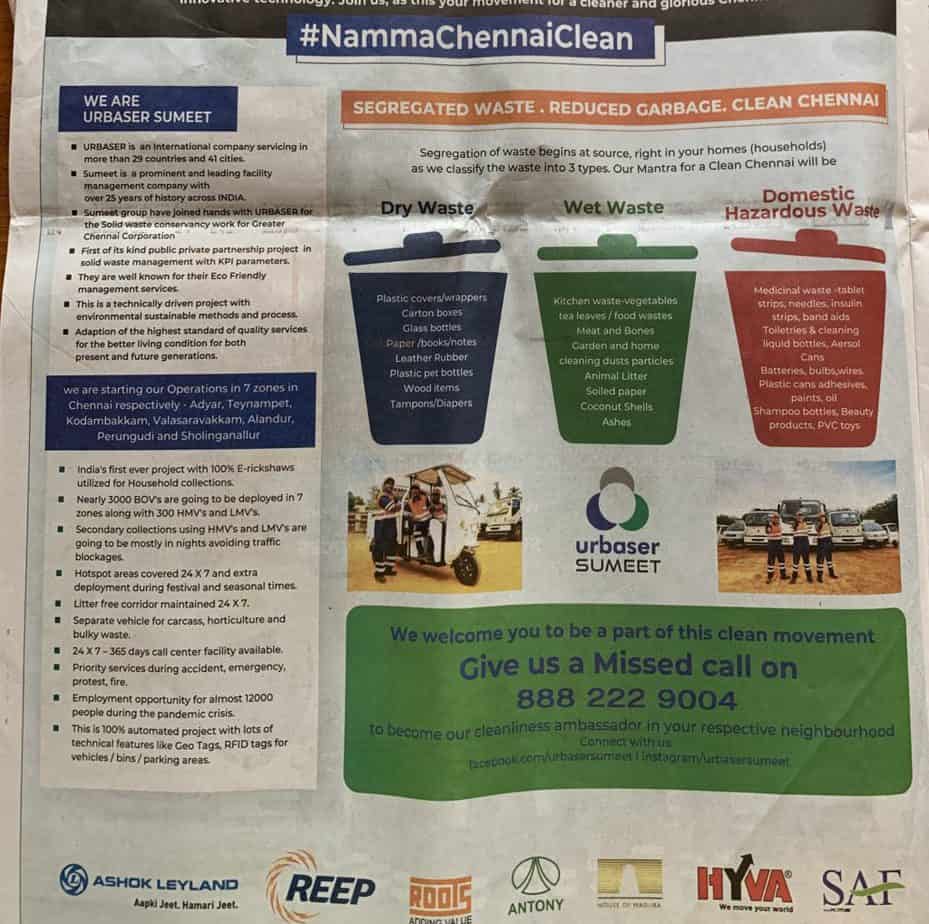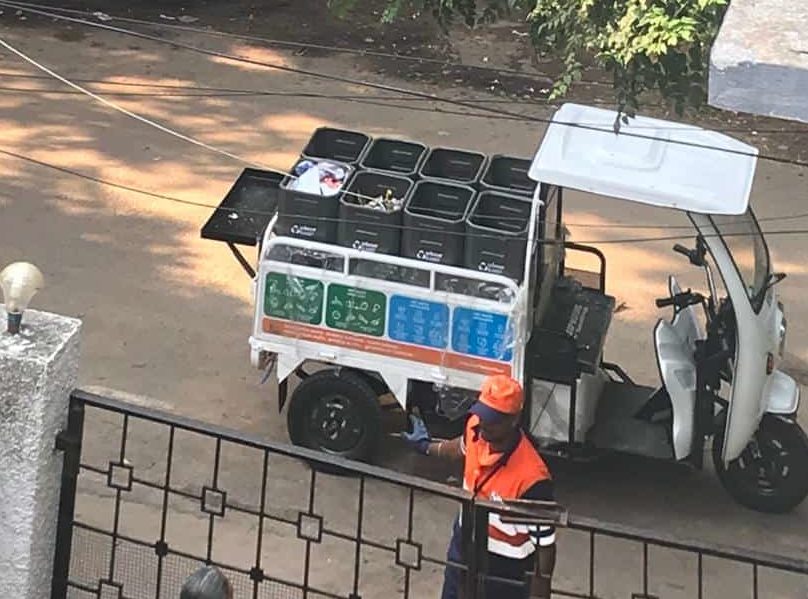October 2. Gandhi Jayanti. Swachh Bharat Day.
It was three years ago on this day that the Greater Chennai Corporation mandated that all residents must segregate their waste at source, and only segregated waste would be collected by the workers of either GCC or Ramky, depending on which zone one lived in (I live in Zone 13- Adyar, one of the largest zones in the city.)
The ensuing three years have been a journey of mixed experiences.. In many areas, citizen groups and resident welfare associations (RWAs), took upon themselves the task of ensuring source segregation of waste in their respective neighbourhoods and localities. There was no information forthcoming from the authorities on how they would enforce the rule, and what would be the penalties for non-compliance.. In the absence of the stick, the carrot rarely works.
So some areas of Chennai went ahead bravely with segregation — working closely with the local GCC/Ramky teams and ensuring that wet waste was sent to the closest MCC (micro composting centre) for composting and the dry (recyclable) waste was given away on a regular basis to recyclers (small unorganised vendors, or Kuppathotti.com, Trashgaadi.com, whichever worked for them).
Some areas were able to go completely binless — the gold standard in decentralised and sustainable solid waste management! Several streets of Harrington Road, Thiruveedi Amman Koil street in Mandaveli, Valmiki Nagar – there could be many more – I am only naming a few that come to mind.
In our area, we were able to bring down the number of street side bins from 11 to 2 and we could not wait to get rid of those two as well!! But the overall condition of the city did not improve much – in fact, in Swaach Sarvekshan 2020, Chennai ranked third among the dirtiest megacities in the country.
Over a 1000 days later, another Swacch Bharat Day dawns, with a new concessionaire having been appointed to take over the Solid Waste Management for seven zones in the city. It is an ambitious programme no doubt, and GCC officials have been at pains to point out that unlike in the case of Ramky, Urbaser Sumeet will be held to strict performance metrics, and their compensation will be based on their meeting these benchmarks.
Needless to say, the waste warriors of the city were beside themselves with joy, and very anxious to work with/help/volunteer with the new service provider.

Yesterday was Day 1. Urbaser Sumeet’s operations were inaugurated by the Chief Minister of Tamil Nadu, and accompanied by full front page advertisements in all mainstream newspapers. While everyone was duly impressed by the scale of their operations, fleet of vehicles (autos, battery operated vehicles, high tech dumpsters etc), two things stood out for us:
The segregation messaging was all wrong! Any one who works at any level in Solid Waste Management will testify to the importance of conveying, over and over again, the message of source segregation. What goes into which bin, what needs to be disposed of carefully, what can be composted, red bin, green bin and blue bin. The message must be repeated ad infinitum, ad nauseam.
Imagine our horror when we found that tampons and diapers had been clubbed with dry recyclable waste like cartons and plastics. Animal litter had been clubbed with food scrapping and garden waste!

Incorrect messaging on source segregation in a newspaper advertisement
Surely a company that was undertaking such a large operation should have had their ad copy checked by an expert. Such incorrect messaging can undo hours and months of volunteering in the community, and sure enough there was an uproar among the SWM volunteers. Natarajan of Namma Ooru Foundation, posted about this on his Facebook page, and several experts, including Mr Sultan Ismail, shared their dismay at this careless and incorrect messaging. Fingers crossed that this will be corrected quickly and disseminated widely.
Secondly, Urbaser Sumeet had called for volunteers to help make the city clean, but they had completely ignored all efforts by RWA volunteers, to reach them, during the past couple of weeks. They did not take calls, did not show up for meetings at the local ward level, did not take our offer of help, given our detailed knowledge of our respective areas.. It looked like they wanted help, but not from us. On this one too, we all hope things will change soon. We want to tell them to let us in, and let us help – after all, there is no one more invested in this process than the citizens of Chennai!
Urbaser Sumeet has reintroduced bins on all streets of the zones they are working in, much to the consternation of citizens in areas like the ones I mentioned earlier. They insist their model is about segregation at the door step, collection in street side bins and transport to the processing centre. And once this is streamlined, they will slowly phase the bins out.
Taking note of how much this point has agitated citizens like me (we want binless streets, remember?), Greater Chennai Corporation Commissioner Mr G Prakash says, “We are making a transition to a performance-based method. There will be teething troubles initially. Midcourse corrections will be done too.”
Our endeavour in GCC is to have a city with a complete hygiene cycle, with solid and liquid waste management. Small and big, 38 projects were rolled out to transform the city’s waste management.
Hygiene is the simplest and most easily achievable goal, with cooperation from the public. Segregation at home will help us achieve the goal soon. It’s plainly a question of attitude. If a group of streets segregate, the entire ward will become hygienic. We want the city to have a discipline-oriented process.
– G Prakash, GCC Commissioner
Today is Day 2.

The first reports are cautiously optimistic. It is a mammoth task no doubt. No one wants to own the waste problem – I will throw this out of my house, and then it is someone else’s problem. And like all transitions, this one too is going to be a bit painful, a bit bumpy. It will appear as if different entities are working at cross purposes. But hopefully we are all headed in the same direction and to the same destination of Clean Chennai, Singara Chennai.
an advisory that pruning of trees, shrubs should be done on a particular day of the week or month and preferably collected and kept at the respective properties and not on pavements